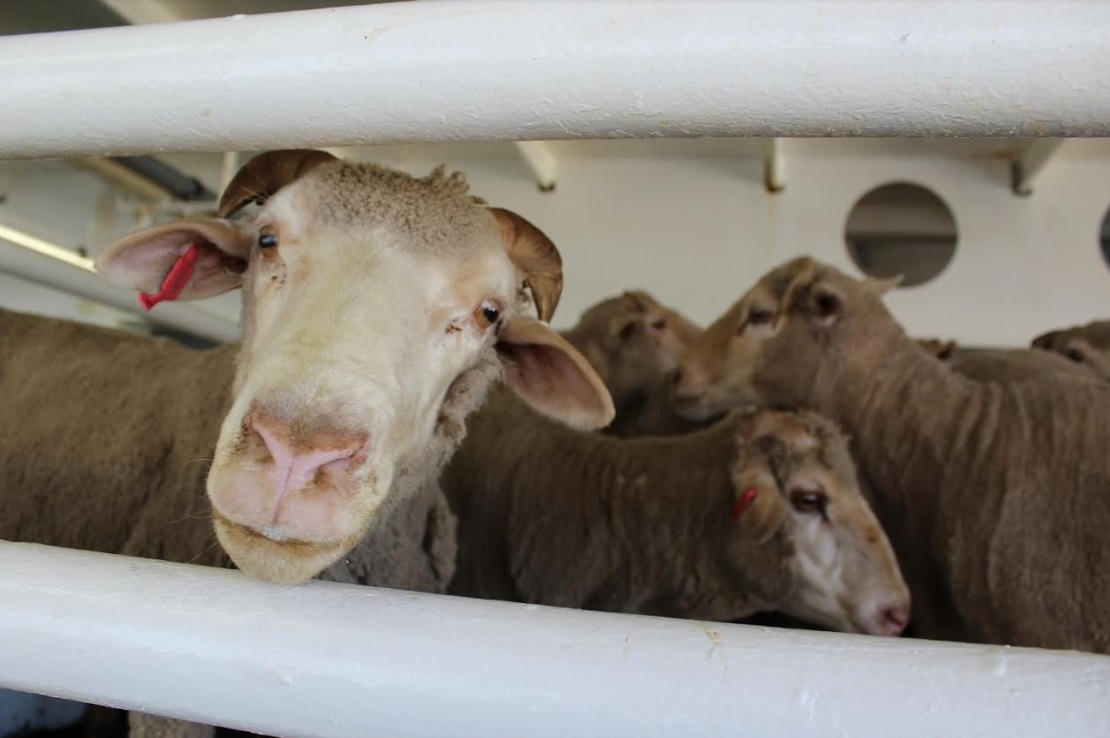 LIVESTOCK exporters are not rushing to organise sheep and cattle shipments despite a change to the departmental approval regulations aimed at addressing an activist threat of legal action.
LIVESTOCK exporters are not rushing to organise sheep and cattle shipments despite a change to the departmental approval regulations aimed at addressing an activist threat of legal action.
Minister for Agriculture and Water Resources David Littleproud yesterday signed a regulation addressing the threat of a court injunction stopping live export ships from leaving port.
Sheep Central understands the regulation change brings forward the time when a shipment could be approved by about three weeks, to allow any legal challenges to be settled before livestock reach a feedlot or are loaded.
The opportunity to lodge an injunction against a live export licence approval will now be brought forward to when the Department of Agriculture and Water Resources approves an exporter’s notice of intent to send a shipment, the minister’s release said.
Uncertainty has dogged the Middle East live sheep and cattle trade from Western Australia since WA exporters Emanuel Exports and its subsidiary EMS Rural Exports had their licences suspended in the aftermath of video footage showing dead and dying overheated sheep on several voyages to the Middle East. This prompted community outrage, government investigations, new loading density rules and higher penalties for animal welfare infringements and legislation to phase out the Middle East northern summer trade.
Other WA exporters have been reluctant to commit to shipments while there is a threat of a legal injunction by Animals Australia if the department issues a licence during the northern summer months.
Animals Australia has threatened the department with legal action if it approved a permit for a Middle East sheep shipment during the northern summer months, claiming it is not possible for the DAWR secretary to reach the required level of satisfaction to grant a permit for such a shipment.
Legal injunctions will need to be lodged earlier – WAFarmers
WAFarmers said the Export Control (Animals) Amendment (Approving Notices of Intention to Export) Order 2018 will require any challenge to a shipment being made prior to the animals travelling to the port.
WAFarmers president Tony York said the amendment by Mr Littleproud will minimise some of the risk of an injunction being lodged to disrupt a shipment at the port.
“The Export Control Amendment Order will require an injunction to be lodged earlier in the process when the regulator approves a permit to export, rather than when the sheep are already on board a shipment,” he said.
“WAFarmers raised the threat of an injunction with Minister Littleproud, and highlighted it was a critical trigger point in any exporter trialling a shipment under McCarthy recommendations.
“We commend the minister for having the foresight to address this issue and adding some certainty back into the live sheep trade.
“WAFarmers is hopeful this progress will add some confidence to the exporters,” Mr York said.
“I would encourage any exporter with a valid permit to consider recommencing the trade.”
Regulation change diminishes legal action risk – ALEC

ALEC CEO Simon Westaway.
Australian Livestock Exporters’ Council chief executive officer Simon Westaway said the risk of an injunction later in the approval process will be greatly diminished by the regulation change.
He said an export permit will still be issued close to the time of shipment, although he conceded legal action could still be taken just prior to a shipment.
“The notice of intention will be approved well prior so if an organisation has an issue with an approaching live export shipment, all the information for the decision of the department will be finalised in some cases weeks prior.”
“What this new arrangement will do will create a stronger position for an exporter in terms of any fear of any potential legal action,” he said.
Mr Westaway said although the industry was “in an unprecedented set of circumstances” it would adjust and move forward when an exporter, an importer partner and country, developed an arrangement that could work commercially, and satisfies all the welfare and logistic requirements.
“The trade is going to work through this period, but we’ve got to be able to do that.”
Mr Westaway expected trading conditions would become easier as the northern summer months ended.
WA exporters are still concerned
However, exporters today said they were still concerned Animals Australia could still wait to just before shipping to bring an injunction against the department if it approved an export licence during the northern summer months up to October 31.
Otway Livestock Exports had scheduled a shipment of 5000-10,000 sheep and 4000-5000 cattle to depart from Fremantle in July for Israel, but cancelled this due to the uncertainty created by Animals Australia’s legal action threat and the viability of the new stocking density rules recommended by the McCarthy Review.
OLE operations manager Jim Teasdale said despite the approval regulation change the company’s customer in Israel still did not want to take the risk of a northern summer shipment until the legal situation was tested.
“Once the northern summer is over and someone does it – whether it us or someone else – than we will know, but we are living day-by-day at the moment and wondering what the outcome will be.”
Harmony Agriculture and Food managing director Stephen Meerwald said bringing forward the time when a shipment could be approved could make a difference should there be a legal challenge before stock came into quarantine, allowing a court to determine if the department had the authority to issue an export permit or not.
But the issue remained when would a legal challenge be made, he said.
“They could wait until the sheep the sheep were in quarantine.
“I guess it doesn’t remove all doubt, but it does create an opportunity for the legal argument to be heard without livestock being caught up in it,” he said.
“I think the second issue is that most of the industry is dealing with the commercial aspect of the trade that we participate in.”
He said Harmony was dealing with a very focussed demand in Oman around the Eid al Adha or festival of sacrifice in a week’s time, with little post-Eid demand.
“The other aspect, at least in our consideration, is the interpretation of the northern summer in the McCarthy Review for this year is six months through to October 31, and the stocking density allometric applies through that period.
“That has a significant commercial impact that would make it quite challenging for us,” he said.
“I doubt that would work for us in the market we were going to and it may have impacts in other markets.
“The reality is commercially, if we could get something to work, we would certainly look at trying to get back to business as quickly as possible,” Mr Meerwald said.
“If that meant being first-up, well that’s what it would mean, but I don’t think we are in that position, because our market opportunity has been lost as a result of this confusion over the last couple of months.”
Time for ALEC members to act – Littleproud

WAFarmers president Tony York, left, with Minister for Agriculture and Water Resources David Littleproud at Lambex 2018.
Mr Littleproud thanked Mr York for his leadership on the shipment approval issue.
“Whilst I don’t believe the injunction issue was a serious barrier to an exporter genuine about sending a ship, the Australian Livestock Exporters Council had raised the issue and we want to remove this perceived barrier to the trade. We acted.
“Now it’s the turn of ALEC members to act,” he said.
“They’ve said they can export sheep to the Middle East through the northern summer without incident and now it’s time to show us.”
Mr Littleproud claimed there has been a co-ordinated campaign to force the government to roll back animal welfare requirements by blaming it the lack of shipments since Emanuel was suspended, and attacking the McCarthy Review.
“Some have suggested the stocking density reduction makes the trade unviable, despite the fact Emanuel was ready to export before having its licence suspended by the independent regulator.”
Emanuel was the only company to take sheep through the Persian Gulf to the Middle East last northern summer.
Mr Littleproud said there would be no compromise on animal welfare.
“The trade is open and will remain so.
“Exporters say they can do this and do it right. Now is the time to prove it.”

It is good to see Minister Littleproud’s moves to ensure that any legal challenge to a shipment must be mounted before the sheep are taken to an export depot. This effectively means that the sheep contracted for a shipment will remain on farm until the threat of a legal challenge is extinguished; thus not exposing exporters to the risk of a forced sale of a whole shipment.
In the 1990s, with GM Livestock Exports for Elders we were caught with a full export depot of 70,000-odd sheep when all shipments to Saudi Arabia were dramatically cancelled due to scabby mouth. Apart from ongoing feedlot costs, we eventually sold the sheep for about 40 percent of their original cost, thus incurring a very substantial loss.
On a further note as reported earlier in this article, the export licenses of Emanuael and its subsidiary EMS have been cancelled. I find this most perplexing as Emanuel and EMS have been in the trade for over sixty years and the Daws family of Emanuel almost single-handedly developed the live trade to Kuwait; a long-lasting and most valuable trade for Australia. I have seen the Emanuels organisation at first-hand and that company has always been regarded as the ‘gold standard’ in expertise in sheep exports.
As I have now retired I have not been privy to the confidential details behind the license cancellation but as each and every phase of each shipment is regulated and controlled in minute detail by Mr Littleproud’s Department from preparation, loading, the voyage and discharge with inspectors and government Vets present at all times, where did Emanuels and EMS go wrong? What was done to justify the cancellation of their licenses? Surely some blame must come to rest on Minister Littleprouds own Department.
If Animals Australia truly cared about the welfare of animals then:
a) why did they wait six months before releasing the footage in February?
and b) they woud raise any objections to a shipment before the animals were anywhere close to being on their way to the ship and before they were in the feedlot prior to loading.